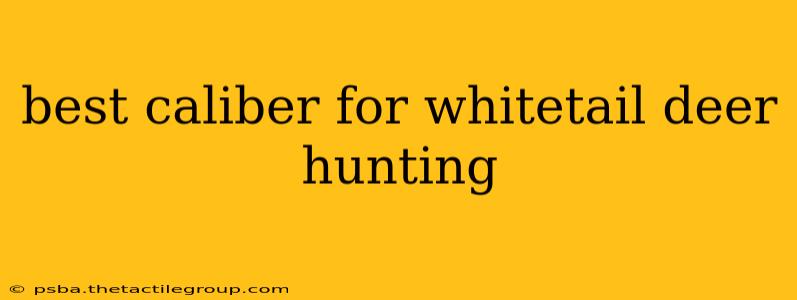Choosing the right caliber for whitetail deer hunting is crucial for a clean, ethical kill and a successful hunt. There's no single "best" caliber, as the ideal choice depends on several factors, including hunting conditions, shooting distance, personal preference, and ethical considerations. This guide will explore various popular calibers, their pros and cons, and help you make an informed decision.
Factors to Consider When Choosing a Caliber
Before diving into specific calibers, let's examine the key factors influencing your choice:
-
Shot Distance: Will you be hunting in open fields where long shots are common, or in dense woods with closer encounters? Longer ranges demand flatter-shooting cartridges with superior ballistic coefficients.
-
Terrain: Thick brush requires a bullet that retains its energy and penetrates effectively even after striking branches. Open terrain allows for more precise shots with potentially less bullet deflection.
-
Ethical Considerations: A responsible hunter prioritizes a quick, clean kill. Choosing a caliber with sufficient stopping power minimizes suffering for the animal. Overpenetration should also be considered to prevent unintended harm to the surrounding environment.
-
Personal Preference and Experience: Your comfort level and familiarity with a specific firearm and caliber are essential. Choosing a weapon you're proficient with will significantly increase your accuracy and hunting success.
-
Recoil: Heavier calibers produce more recoil, which can be uncomfortable, especially for new hunters or those with physical limitations.
Popular Calibers for Whitetail Deer Hunting
Several calibers consistently prove effective for whitetail deer hunting. Here's a breakdown:
Smaller Calibers (under .270):
-
.243 Winchester: A popular choice for beginners due to manageable recoil. Excellent accuracy at moderate ranges, but may require precise shot placement for larger deer.
-
6.5 Creedmoor: Growing in popularity due to its flat trajectory, low recoil, and excellent accuracy at longer ranges. Offers good energy retention.
-
.270 Winchester: A classic choice that provides a good balance of accuracy, power, and manageable recoil. Effective at longer ranges.
Medium Calibers (.270 - .308):
-
.270 Winchester (Reiteration): As mentioned above, a versatile and reliable choice.
-
7mm-08 Remington: Offers a good balance of power and recoil, making it suitable for various hunting conditions and skill levels.
-
.308 Winchester: A powerful and versatile cartridge with widespread availability and a large selection of ammunition. Excellent for both short and medium-range shots.
Larger Calibers (.30-06 and above):
-
.30-06 Springfield: A legendary round known for its power and accuracy. Excellent for longer ranges and larger game, but recoil can be significant.
-
.300 Winchester Magnum: A powerful cartridge designed for long-range shots, but the significant recoil requires practice and proper technique. Generally considered overkill for whitetail deer.
-
7mm Remington Magnum: Similar in power to the .300 Winchester Magnum, with a slightly flatter trajectory. Also considered excessive for most whitetail hunting scenarios.
Choosing the Right Caliber for You
The best caliber for whitetail deer hunting is ultimately a personal decision based on the factors discussed above. Consider your hunting style, the typical shot distances you expect, your physical capabilities, and the specific hunting environment.
Recommendation: For most hunters, a caliber within the medium range (.270 Winchester, 7mm-08 Remington, or .308 Winchester) provides an excellent balance of power, accuracy, and manageable recoil. However, if you are hunting in open areas requiring longer shots, a flatter-shooting cartridge like the 6.5 Creedmoor might be more suitable. Beginners might find the .243 Winchester an excellent starting point.
Remember to practice extensively with your chosen firearm before hunting season to ensure accuracy and safe handling. Always prioritize ethical hunting practices, focusing on quick and clean kills. Consulting with experienced hunters and firearm professionals can also provide valuable insights and guidance.

